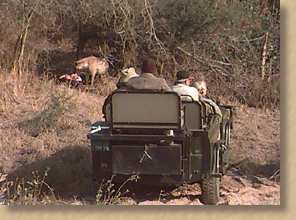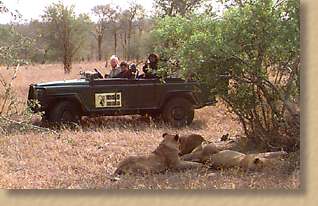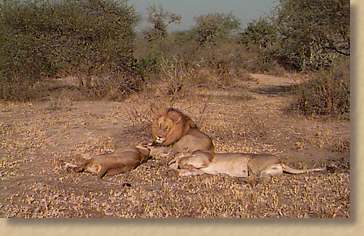|
MalaMala Diary Entry: 4 August 1998
A young buffalo was found dead in the Matshapiri River shortly after a large herd of 500 or so had passed through on the way to drink at the Sand River. The cause of death is not known, but the animal may have been crushed by others against the steep sides of the river-bank. In any event, scavengers were expected. Interestingly, the first to arrive was
the White Cloth female leopard and her cubs. The previous night this
leopard was found hunting in this area and the next morning she was found leading her cub back to the carcass. However, this easy meal was not theirs for long because no sooner had the two leopards started to eat than hyaenas arrived on the scene, chased the leopards away and claimed the kill. Interestingly, the cub of the White Cloth female did not go far and spent several hours watching the hyaenas eat his meal. Like many predators, leopards will scavenge whenever they can, taking easy meat if possible. However, since they are solitary, they dare not risk fighting for their kills and pack animals such as hyaenas and lions will quite easily get the better of them when fighting for meat which has not been secured out of their reach.
event, scavengers were expected. Interestingly, the first to arrive was
the White Cloth female leopard and her cubs. The previous night this
leopard was found hunting in this area and the next morning she was found leading her cub back to the carcass. However, this easy meal was not theirs for long because no sooner had the two leopards started to eat than hyaenas arrived on the scene, chased the leopards away and claimed the kill. Interestingly, the cub of the White Cloth female did not go far and spent several hours watching the hyaenas eat his meal. Like many predators, leopards will scavenge whenever they can, taking easy meat if possible. However, since they are solitary, they dare not risk fighting for their kills and pack animals such as hyaenas and lions will quite easily get the better of them when fighting for meat which has not been secured out of their reach.
Warthogs have been spotted all over, the green grass of the camps proving
very tempting and causing them to enter, much to the horror of the
gardeners as they try their best to maintain the lawns. Warthog numbers
seem to have increased in the last few years after they crashed following the severe drought of 1992. As the dry season progresses, so warthogs use the strong cartilage in their nose to root around, digging up the nutrient rich roots and tubers of grasses and other plants.
Lion  viewing continues to be good, with sightings of several prides over the last ten days - these include the Styx, Eyrefield, Charleston and River Rocks prides. Members of the Charleston pride have continued with their daylight hunting and have been found on the fresh carcasses of zebra, kudu and impala, all killed at or soon after midday. The Styx pride have continued to wander widely through their range, but now seem to be breaking up somewhat as the young males of this pride are moving off. This week one of the young males was missing, as were the two other males which
had been seen with the pride several weeks ago. Perhaps all three have
now decided to head off and become nomadic, the stage all young males go
through before they eventually reach physical maturity and fight for
dominance of territory and the prides such territories contain. viewing continues to be good, with sightings of several prides over the last ten days - these include the Styx, Eyrefield, Charleston and River Rocks prides. Members of the Charleston pride have continued with their daylight hunting and have been found on the fresh carcasses of zebra, kudu and impala, all killed at or soon after midday. The Styx pride have continued to wander widely through their range, but now seem to be breaking up somewhat as the young males of this pride are moving off. This week one of the young males was missing, as were the two other males which
had been seen with the pride several weeks ago. Perhaps all three have
now decided to head off and become nomadic, the stage all young males go
through before they eventually reach physical maturity and fight for
dominance of territory and the prides such territories contain.
The four new males now in charge of the female prides in the north
of Mala Mala have yet to encounter the Styx pride females. The nine
lionesses of the Eyrefield pride seem to have captured all of their
attention, this directed not only at the killing of the young cubs which
were fathered by their predecessors, the Manyelethi males, but also the
mating of the lionesses. The large Eyrefield pride have been spending
much time together lately, the stress of the attentions of the new
males probably causing this behaviour. Typically large prides of females
do not spend much time together; if they are in groups too large then
kills will have to be made very frequently if all are to get a good supply of meat - the larger the pride, the less meat per lion at every kill and particularly in a region such as Mala Mala when much of the prey encountered are small animals such as impala. This last week six members of the Eyrefield pride were seen killing a young kudu, but the females ate nearly nothing as the males in attendance at the time claimed all. have yet to encounter the Styx pride females. The nine
lionesses of the Eyrefield pride seem to have captured all of their
attention, this directed not only at the killing of the young cubs which
were fathered by their predecessors, the Manyelethi males, but also the
mating of the lionesses. The large Eyrefield pride have been spending
much time together lately, the stress of the attentions of the new
males probably causing this behaviour. Typically large prides of females
do not spend much time together; if they are in groups too large then
kills will have to be made very frequently if all are to get a good supply of meat - the larger the pride, the less meat per lion at every kill and particularly in a region such as Mala Mala when much of the prey encountered are small animals such as impala. This last week six members of the Eyrefield pride were seen killing a young kudu, but the females ate nearly nothing as the males in attendance at the time claimed all.


|

 event, scavengers were expected. Interestingly, the first to arrive was
the White Cloth female leopard and her cubs. The previous night this
leopard was found hunting in this area and the next morning she was found leading her cub back to the carcass. However, this easy meal was not theirs for long because no sooner had the two leopards started to eat than hyaenas arrived on the scene, chased the leopards away and claimed the kill. Interestingly, the cub of the White Cloth female did not go far and spent several hours watching the hyaenas eat his meal. Like many predators, leopards will scavenge whenever they can, taking easy meat if possible. However, since they are solitary, they dare not risk fighting for their kills and pack animals such as hyaenas and lions will quite easily get the better of them when fighting for meat which has not been secured out of their reach.
event, scavengers were expected. Interestingly, the first to arrive was
the White Cloth female leopard and her cubs. The previous night this
leopard was found hunting in this area and the next morning she was found leading her cub back to the carcass. However, this easy meal was not theirs for long because no sooner had the two leopards started to eat than hyaenas arrived on the scene, chased the leopards away and claimed the kill. Interestingly, the cub of the White Cloth female did not go far and spent several hours watching the hyaenas eat his meal. Like many predators, leopards will scavenge whenever they can, taking easy meat if possible. However, since they are solitary, they dare not risk fighting for their kills and pack animals such as hyaenas and lions will quite easily get the better of them when fighting for meat which has not been secured out of their reach.
 viewing continues to be good, with sightings of several prides over the last ten days - these include the Styx, Eyrefield, Charleston and River Rocks prides. Members of the Charleston pride have continued with their daylight hunting and have been found on the fresh carcasses of zebra, kudu and impala, all killed at or soon after midday. The Styx pride have continued to wander widely through their range, but now seem to be breaking up somewhat as the young males of this pride are moving off. This week one of the young males was missing, as were the two other males which
had been seen with the pride several weeks ago. Perhaps all three have
now decided to head off and become nomadic, the stage all young males go
through before they eventually reach physical maturity and fight for
dominance of territory and the prides such territories contain.
viewing continues to be good, with sightings of several prides over the last ten days - these include the Styx, Eyrefield, Charleston and River Rocks prides. Members of the Charleston pride have continued with their daylight hunting and have been found on the fresh carcasses of zebra, kudu and impala, all killed at or soon after midday. The Styx pride have continued to wander widely through their range, but now seem to be breaking up somewhat as the young males of this pride are moving off. This week one of the young males was missing, as were the two other males which
had been seen with the pride several weeks ago. Perhaps all three have
now decided to head off and become nomadic, the stage all young males go
through before they eventually reach physical maturity and fight for
dominance of territory and the prides such territories contain.
 have yet to encounter the Styx pride females. The nine
lionesses of the Eyrefield pride seem to have captured all of their
attention, this directed not only at the killing of the young cubs which
were fathered by their predecessors, the Manyelethi males, but also the
mating of the lionesses. The large Eyrefield pride have been spending
much time together lately, the stress of the attentions of the new
males probably causing this behaviour. Typically large prides of females
do not spend much time together; if they are in groups too large then
kills will have to be made very frequently if all are to get a good supply of meat - the larger the pride, the less meat per lion at every kill and particularly in a region such as Mala Mala when much of the prey encountered are small animals such as impala. This last week six members of the Eyrefield pride were seen killing a young kudu, but the females ate nearly nothing as the males in attendance at the time claimed all.
have yet to encounter the Styx pride females. The nine
lionesses of the Eyrefield pride seem to have captured all of their
attention, this directed not only at the killing of the young cubs which
were fathered by their predecessors, the Manyelethi males, but also the
mating of the lionesses. The large Eyrefield pride have been spending
much time together lately, the stress of the attentions of the new
males probably causing this behaviour. Typically large prides of females
do not spend much time together; if they are in groups too large then
kills will have to be made very frequently if all are to get a good supply of meat - the larger the pride, the less meat per lion at every kill and particularly in a region such as Mala Mala when much of the prey encountered are small animals such as impala. This last week six members of the Eyrefield pride were seen killing a young kudu, but the females ate nearly nothing as the males in attendance at the time claimed all.




